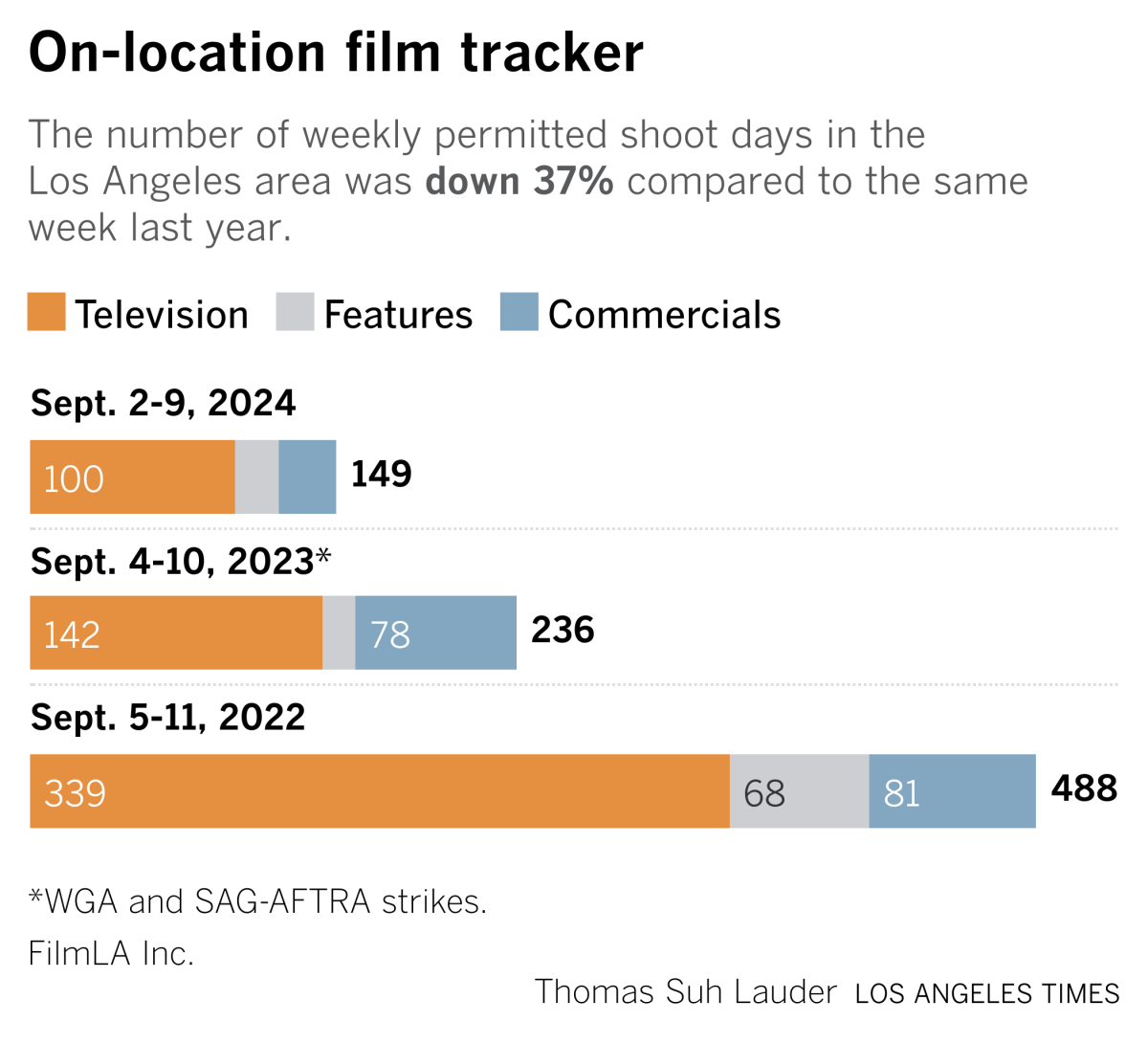Disputes over ESPN, Disney and DirecTV go to the heart of TV’s existential problems

- Share via
By the time you read this article, Walt Disney Co. and DirecTV may have resolved their dispute. Or they may have not, leaving 11 million customers still without access to ESPN, local ABC stations and many other channels.
Amid the contest of wills between the media giants, DirecTV subscribers missed out on Aaron Rodgers’ return to the New York Jets’ “Monday Night Football” battle against the San Francisco 49ers following last year’s season-ending injury. That is, unless viewers decided to switch providers or cut the cord in favor of YouTube TV or Hulu + Live TV. Those options have been a key source of Disney’s leverage in this spat, as they have been in similar past disputes, including last year’s standoff with Charter.
Once the issues are resolved and both sides declare victory, there will be plenty of time to analyze who came out on top and which company entered the fray with the best hand to play.
Was it the Burbank-based entertainment giant with the must-have sports and children’s programming? Or was it the long-struggling El Segundo satellite TV operator with every incentive to hold firm because its subscriber counts were already in free fall?
As many have noted, including my colleague Meg James, the clash came at a particularly ominous moment for the pay-TV business. Viewers are briskly abandoning their cable and satellite packages. DirecTV needs sports programming from companies such as Disney, the one thing keeping the traditional pay-TV bundle afloat. Unlike Charter, which possesses a lucrative broadband arm, DirecTV doesn’t have some other business to fall back on.
Disney wants higher fees from DirecTV to help cover escalating programming costs, driven by increases in the amount the Mouse House has to pay the NBA and NFL to broadcast games. The company also wants to enforce “minimum penetration” thresholds for its channels to keep subscriber counts high. At the same time, it’s moving much of its entertainment content away from the bundle and onto its streaming services Disney+ and Hulu, while also planning to sell the flagship ESPN channel directly to cord-cutters.
Put together, that’s a recipe for conflict.
But one of the darkest recent omens for the entertainment industry came in the context of a separate case: The lawsuit over Venu Sports, a yet-to-launch joint venture planned by Disney, Warner Bros. Discovery and Fox Corp.
To recap, the three media conglomerates announced Venu in February as a way for people to access their sports programming without a cable subscription. The venture planned to charge $43 a month.
Fubo, a streaming service that bundles live channels with an emphasis on sports, sued, arguing that the strategy was anticompetitive. Fubo contended that its contracts with the programmers blocked it from starting a sports-focused “skinny bundle,” but now those same companies are starting their own sports-only offering that could threaten its business.
That’s unfair, Fubo said, and a federal judge agreed last month, temporarily blocking Venu’s launch on the grounds that Fubo was likely to prevail in its case on the merits.
That, on its own, is bad news for Disney, Warner Bros. Discovery and Fox. But the Fubo ruling could actually be even more consequential than it seems at first glance. In her ruling, U.S. District Court Judge Margaret Garnett took a side swipe at the broader practice of bundling channels in bulk, seeming to question a strategy that forms the bedrock of the pay-TV industry as we know it.
“[I]t is difficult to avoid the conclusion that, on balance, these practices are bad for consumers,” Garnett wrote in her ruling. “These mind-bending costs do not just hurt the wallets of sports-loving consumers by making them pay for non-sports channels they don’t want, but also hurt those customers who only want entertainment channels but pay significantly higher costs because they are made to pay for unwatched sports, the most expensive of all content.”
Of course, the practice in question — making it so that distributors, and thus consumers, have to pay for a bunch of channels they don’t watch in order to get the narrow selection of stuff they actually want — is how the TV business has worked for decades. To be sure, Garnett makes it clear that she’s not actually deciding on the legality of bundling as a whole in granting Fubo’s request for a preliminary injunction. That determination ought to be made at a trial. Further, she’s careful throughout the ruling not to lean too far one way or the other.
But even subtly questioning the legality of bundling ought to raise a few eyebrows in Hollywood.
Indeed, Garnett’s statements did not escape the attention of the analysts at MoffettNathanson, who are among the closest chroniclers of the bundle’s gradual but accelerating demise. “Not only is it likely that Venu will never see the light of day,” the analysts wrote in a note to clients published last week. “It’s possible that Venu’s ham-fisted go-to-market strategy has started the ball rolling toward the complete collapse of the pay-TV model as we know it.”
DirecTV cited Garnett’s ruling in a complaint filed over the weekend with the Federal Communications Commission, contending that Disney has acted in bad faith during their negotiations. The document alleges, among other things, that Disney demanded that DirecTV agree not to sue, perhaps preempting a case similar to Fubo’s.
Not unlike Fubo, DirecTV wants the option to offer customers smaller packages of channels that are cheaper and more closely aligned with viewers’ tastes and interests. The company says Disney “wants to force DirecTV to carry a ‘fat bundle’ including less desirable Disney programming — while itself offering cheaper, ‘skinnier’ bundles of programming that consumers want.”
Disney denies these claims, and has said that DirecTV has misrepresented the facts about their negotiations. In a recent statement, Disney entertainment co-chairs Dana Walden and Alan Bergman and ESPN chairman Jimmy Pitaro said they “believe there is a path to a fair and flexible agreement that strikes this critical balance and works for all sides, especially the consumer.”
Barbed press releases are the norm in the battles such as these, especially with high-stakes football broadcasts on the line. But with everything going on at DirecTV, Disney and the industry at large, this is clearly not just any old carriage dispute.
You’re reading the Wide Shot
Ryan Faughnder delivers the latest news, analysis and insights on everything from streaming wars to production — and what it all means for the future.
You may occasionally receive promotional content from the Los Angeles Times.
Stuff we wrote
Univision news anchor Jorge Ramos will exit network at the end of the year. Ramos and Univision are parting ways after a mutual agreement not to renew the popular journalist’s contract.
Why ESPN’s Stephen A. Smith is bringing his hot takes to politics. ‘I love being part of the mix.’ The star of “First Take” has been taking on issues beyond sports through his podcast and on cable news networks, some of which have offered contributor roles, he says.
To fund new movies, ‘American Psycho’ producer turns to the crowd. Pressman Film, the studio behind “Thank You for Smoking” and “The Crow,” is looking to raise funds for its upcoming development slate through crowd investing, a twist on a tactic used by other companies.
‘Rust’ shooting prosecutor asks judge to reopen Alec Baldwin manslaughter case. Nearly three years after Alec Baldwin accidentally shot “Rust” cinematographer Halyna Hutchins, a prosecutor asks judge to take another look at her dismissal of the manslaughter case against the actor.
ICYMI:
KLOS-FM fires Kevin Ryder and Doug ‘Sluggo’ Roberts
NBC cuts Fallon to four nights a week
Investor challenges Murdoch’s longtime control over News Corp
Apple touts latest AI tools for iPhone 16
Number of the week

Big money, big influence.
Larry Ellison, one of the world’s richest people, will become controlling shareholder of Paramount Global once the long-awaited deal with his son’s entertainment firm Skydance Media closes, pending regulatory review. Following the transaction, Ellison investment vehicle Pinnacle Media will own 77.5% of National Amusements Inc., the Massachusetts firm that holds the Redstone family’s voting Paramount stock.
The remaining 22.5% of NAI will go to an entity called RB Tentpole, which is controlled by Gerry Cardinale’s private investment firm RedBird Capital Partners, the Ellisons’ partner in the Paramount deal.
Ellison supplied the bulk of the $8.4 billion that makes up the Skydance-Paramount deal, $2.4 billion of which goes to pay off Shari Redstone and her family, with the other $6 billion earmarked for other Paramount shareholders and the company’s balance sheet. As part of the deal, Paramount will absorb Skydance at a valuation of $4.75 billion. The company is in the process of a major cost-cutting effort.
The filing was triggered by FCC rules requiring the prospective Paramount acquirers to seek federal approval to transfer control of the company’s licenses to operate its 28 owned and operated CBS television stations.
The Ellisons and RedBird argued in their filing that the infusion of capital from the deal will “strengthen and revitalize” the broadcasting services Paramount currently provides. They said the takeover “will not result in a diminution of competition or present any other harms” because the two parties do not currently own any other broadcast stations.
Film shoots
Production in Los Angeles was basically flat week to week and down quite a bit from last year, according to FilmLA data.

Finally ...
Check out The Times’ excellent interview with musician Nick Cave, on the occasion of his new album with the Bad Seeds, “Wild God.”
In the “one for me” column, I’ve been enjoying the latest from Phoenix death metal band Gatecreeper, called “Dark Superstition.” Use it to get through your latest workout, but please stay hydrated out there.
Inside the business of entertainment
The Wide Shot brings you news, analysis and insights on everything from streaming wars to production — and what it all means for the future.
You may occasionally receive promotional content from the Los Angeles Times.




